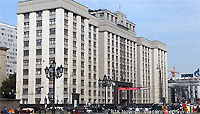NGO Bill Debated on Eve of Duma Vote
Alexander Bratersky - Moscow Times - themoscowtimes.com - 7.6.12 - JRL 2012-122
Supporters and opponents of legislation to tighten the screws on foreign-funded nongovernmental organizations hotly debated the bill Thursday, the eve of a first reading in the State Duma.

file photo
"Citizens have a right to know about organizations that use foreign founding," United Russia Deputy Irina Yarovaya, who co-authored the bill, told a roundtable.
She said a stipulation requiring foreign-funded NGOs that engage in "political activity" to register as "foreign agents" with the Justice Ministry would do nothing more than bring existing NGO law into line with the European norm.
But NGO leaders said the bill targeted specific organizations unpopular with the government.
"It looks like the law is written for Golos," said Lilia Shabanova, executive director of Golos, the only independent elections watchdog in Russia. The group receives grants from the U.S. Agency for International Development and discloses this information on its website.
"When a public organization is placed on a list of political organizations, that prompts a lot of concern," said Shabanova, who stressed that Golos is not involved in political activity.
She was echoed by Boris Nemtsov, a senior opposition leader, who said the legislation put organizations like Golos, Amnesty International and Transparency International "in danger."
"There is a big risk that the NGOs that will be targeted will be those that are the last line of defense for our citizens," said A Just Russia leader Sergei Mironov, adding that his party would not vote for the bill in the Duma on Friday.
Mikhail Fedotov, head of the Kremlin's human rights council and a lawyer by training, cautioned that the legislation lacks a clear definition of "foreign agents."
"A good law is a precise law," he said. "When you draft a law, you should understand whom you want to include in it."
Fedotov, who earlier this week said the Russian Orthodox Church could be affected by the bill because it accepts contributions from believers in other countries, expanded the warning Thursday to include Russian government ministries, which he said accept foreign funding for various projects.
"I can't imagine a Russian ministry being classified as a foreign agent," he said.
Fedotov said any organization designated a "foreign agent" would face a public relations nightmare because to the public ear, the phrase amounts to calling it a foreign spy.
United Russia lawmakers have defended the phrase, saying they took it from U.S. law. The 1938 law, however, targets political lobbying groups that seek to influence the U.S. government, not NGOs.
Incidentally, the U.S. law was used against Anna Chapman and other Russians arrested in the United States in 2010 on charges of conspiring to act as an agent of a foreign government without notifying the U.S. attorney general.
U.S. lawmakers are keeping an eye on Russia's NGO bill, said Andrei Piontkovsky, a leader of the opposition Solidarity movement. Speaking to Izvestia, he said that his group had met with U.S. Congress members on Wednesday to discuss possible sanctions against the Russian officials who had initiated the NGO bill.
"It's no secret that the list of people declared persona non grata in the European Union and the United States will grow," he said, in a nod to a 2011 U.S. blacklist of dozens of Russian officials implicated in the prison death of lawyer Sergei Magnitsky.
Nemtsov said Thursday that opposition protests would continue with or without the new legislation. "This is an odious, repressive bill that seeks to halt the wave of public protests," he said. "Authorities are preparing for more protests, which will occur regardless of whether the law is passed."
Human rights veteran Lyudmila Alexeyeva said she wouldn't register her Moscow Helsinki Group as a foreign agent.
"I would be very happy to receive Russian funding, but the Russian state doesn't give me any money because I defend Russian citizens from Russian officials," she said.
Duma Speaker Sergei Naryshkin presided over the roundtable. He is the most senior official to publicly address the bill.
Keywords: Russia, Nonprofits, Activists, NGO's - Russian News - Russia
MOSCOW. July 4 (Interfax) - The presidential Human Rights' Council has said that amendments to legislation on nongovernmental organizations receiving foreign grants will deliver a blow to charitable, humanitarian and human rights' projects.

"We recognize the right of the state to organize due public control over the operations of NGOs engaged in political activities in the territory of Russia and receiving funds from foreign sources. However, we object to the concept of the bill and the formulas proposed in it," a statement on the council's website says.
"They (the concept and formulas) do not meet their objective but threaten humanitarian, charitable, human rights and other socially-oriented activities of various NGOs in the interests of Russia and its citizens," the statement says.
"The conditions for these activities have emerged in Russia over the past few years - legislation on NGOs was modified, support programs were adopted and social partnership was established. To pass this bill means to wipe away all these efforts and worsen the position of the people for whom the NGOs work," the statement says.
On Friday the State Duma plans to handle the bill tightening requirements to NGOs receiving foreign grants. The bill was initiated by Untied Russia and implies the registration of NGOs with foreign financing as "foreign agents."
The council's website says that the statement on the impermissibility of amendments to legislation on NGOs was compiled by representatives of Russian NGOs. Several members and experts of the council are among the initiators of the statement.